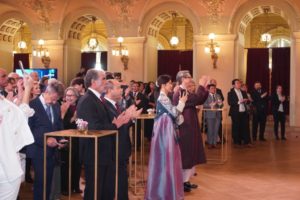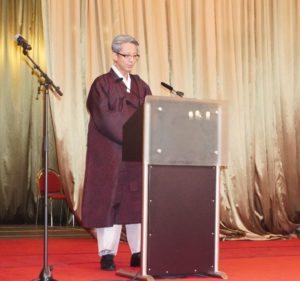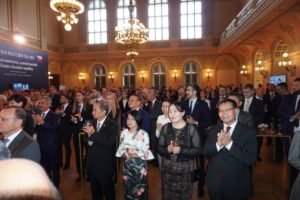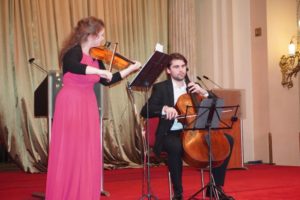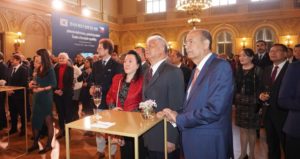- Hans Weber
- December 12, 2025
Celebrating the National Day of Korea: A Reflection on Unity, Tradition, and Progress
On the 16th of October H.E. Youngki HONG Ph. D., the ambassador of the Republic of Korea invited the representatives of the diplomatic corps, Czech politicians, business leaders, artists, and friends of Korea to celebrate at a reception the National Day of Korea at palace Žofín.
The National Day of South Korea, also known as Gaecheonjeol (개천절), is celebrated annually on October 3rd. This important holiday marks the legendary founding of the Korean nation by Dangun, its first mythical king, over 4,350 years ago. According to Korean mythology, Dangun, the “Grandson of Heaven,” established the first Korean kingdom, Gojoseon, in 2333 BCE.
Historical Significance
Gaecheonjeol, translating to “the day the sky opened,” commemorates the moment Dangun descended from the heavens to lay the foundations of Korean culture and society. This origin story is not just a mythical representation but also serves as a symbol of national identity and unity. Dangun’s tale embodies the spirit and resilience of the Korean people, outlasting invasions and colonial rule, fostering a sense of pride in their ancient traditions.
Celebrations and Traditions
The National Day is observed with a variety of patriotic events and ceremonies across South Korea. A prominent feature involves the raising of the national flag, known as the Taegukgi, on homes and public buildings, symbolizing national pride and cohesion. In Seoul, official commemorations are held, including ceremonies at landmark sites, such as the Dangun Shrine on the slopes of Manisan Mountain, where rituals are performed to honor Dangun’s influence and legacy.
Many schools and educational institutions take part in the celebrations, organizing activities that educate students about the rich cultural and historical fabric of their nation. Various cultural performances highlighting traditional Korean music, dance, and arts take place, fostering deeper connections to the country’s history and heritage.
Modern Implications
In contemporary Korea, Gaecheonjeol is a reflection of the country’s journey and development. South Korea’s transformation from a war-torn nation to an economically robust and technologically advanced society is acknowledged and celebrated during this holiday. It serves as a reminder of the ongoing pursuit of further national prosperity, innovation, and global influence.
The day often also sparks discussions on national identity in the context of an increasingly globalized world. Koreans reflect on their cultural roots and how these traditions mold their modern-day customs and values. For the diaspora, it is a connection back to their heritage, celebrated worldwide with various events emphasizing Korean culture, cuisine, and community spirit.
A Day of Reflection and Unity
While the historical roots of Gaecheonjeol are steeped in myth, its significance continues to provide a point of unity for the Korean population. It is a day for celebrating not only the founding myth of the Korean people but also the enduring strength and cultural prowess of South Korea today. The National Day, therefore, is much more than a commemoration of history; it is an affirmation of identity and a collective hope for the future of the Korean peninsula.
Amidst the festivities, it remains a profound reminder of the resilience, determination, and innovative spirit that have carried the nation through millennia.
FOTOs by Jitka Tomecková
By Hans Weber hans.weber@pragueforum.cz
Recent posts
See AllPrague Forum Membership
Join us
Be part of building bridges and channels to engage all the international key voices and decision makers living in the Czech Republic.
Become a member